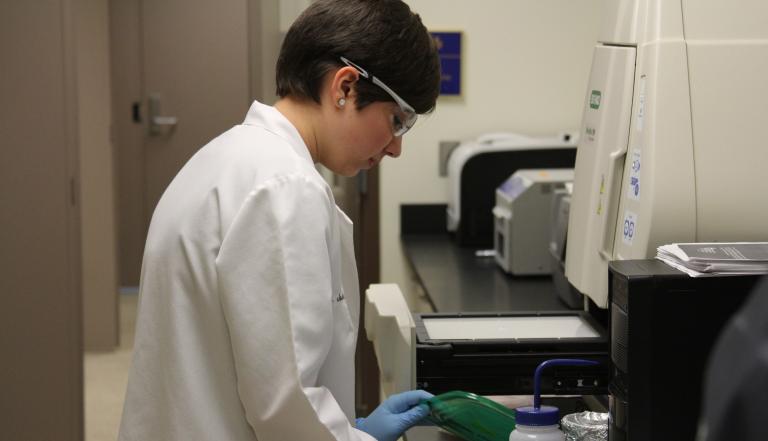
“I wanted to study biology, but also know that a lot of people who study biology sometimes have a hard time finding jobs because they don’t get professional experience. At Kettering, I’m getting that experience before I graduate.”
Student Mia Jonascu chose Kettering University specifically because of the opportunities to gain meaningful professional experience through the co-op program prior to graduating.
Through her co-op position as one of the University’s first Bell-Kagle Interns, Jonascu is not only getting the professional experience she was seeking, she’s also – as just a freshman – playing an integral role in laboratory research that most students wouldn’t be exposed to until they were upperclassmen or even graduate students.
“I chose Kettering for the co-op experience,” said Jonascu, a Swartz Creek, Michigan, native majoring in Applied Biology. “I wanted to study biology, but also know that a lot of people who study biology sometimes have a hard time finding jobs because they don’t get professional experience. At Kettering, I’m getting that experience before I graduate.”
Jonascu’s co-op position is through the new Bell-Kagle Internship program at Kettering. Created with the support of alumnus Bob Kagle ’78, the program was conceived in honor of G. Reginald Bell, Chemistry professor at Kettering, to create paid, full-time research co-op positions for students majoring in Applied Biology, Chemistry and Biochemistry. The program not only helps students in those majors find appropriate co-op employment, but also gives faculty added resources to conduct meaningful applied research on campus.
Dr. Veronica Moorman
Jonascu, one of the first two Bell-Kagle Interns selected this term, is working with Dr. Veronica Moorman, faculty member in Chemistry/Biochemistry, and Dr. Jim Cohen, faculty member in Applied Biology, on research on the evolution of proteins in the bubonic plague.
Moorman and Cohen are using phylogenic analyses, including building evolutionary trees and reconstructing ancestral proteins, to understand the evolutionary origins of YopH, a potent tyrosine phosphatase from the Yersinia pestis, the bacterium that causes the bubonic plague. They intend to determine a likely ancestral protein sequence from the time of horizontal transfer using a method known as ancient gene resurrection. That sequence will then be expressed as a protein in E. coli cells, purified and analyzed.
Jonascu is assisting with a wide range of responsibilities, including working with Cohen to reconstruct phylogenetic trees and working with Moorman to design, express, purify and analyze the enzyme.
“So far, I have been doing lab work as well as computer phylogeny work,” Jonascu said. “I’m looking at how the black plague evolved to become so virulent.”
Having Jonascu in the lab full-time has been a valuable resource to both faculty.
“Mia has been wonderful,” Moorman said. “She’s really dedicated, thoughtful and diligent. That’s the type of student a program like this attracts. It’s great having a student here full-time because it gives us time to actually train her within a full term, as opposed to repeating training over and over with part-time research assistants.”
Jonascu has been able to quickly learn new skills and make meaningful contributions to a project that will likely eventually result in a published paper that will include her name as a contributor – something that is uncommon for an undergraduate.
“The opportunity to do on-campus research was very interesting to me,” she said. “I’m able to gain a broader perspective on my research by working with faculty members outside my major. It’s a very valuable experience.”
Dr. Jim Cohen
The fact that she’s working closely with faculty in two different fields will be a benefit to Jonascu as she continues her education and career.
“Mia’s getting exposure to two very different types of techniques,” Cohen said. “She’s learning that science isn’t done alone – no matter what your field is, you have to work with and talk with other people. Getting that experience as a freshman is really useful.”
Jonascu hopes to go into pharmacology and is specifically interested in research and development of new drugs and medications.
“This opportunity is giving me a lot of lab experience,” Jonascu said. “Not a lot of undergraduates at other colleges have opportunities like this. Getting to work immediately and finding out more about what you want to do is really important.”
(Left to right) Mia Jonascu, Professor Reg Bell, Dr. Veronica Moorman and Dr. Jim Cohen.